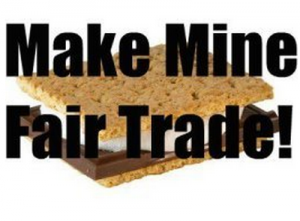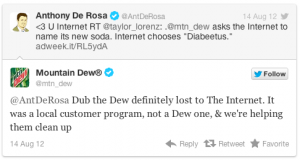By B.L. Ochman
Like many other brands in Internet annals, General Mills has become the latest major corporation to see its social media campaign hijacked. Given similar results against other brands, the easily pranked “tell us why you love us” contest needs to be carefully re-thought.
Brands that don’t monitor social media to learn of sentiment about their industry and their products are in risky territory when they engage fans in social media. The problem: not all fans are happy.
It wouldn’t take particularly sophisticated research skills to learn that generically modified ingredients are an issue for food companies. For fashion companies, issues include labor practices and ideas about physical beauty. And for car makers issues about fuel efficiency, the environment and safety don’t take a genius to uncover. It should also come as no surprise that many people like to punk brands simply because they can.
Why are brands surprised?
How then, can brands like General Mills, Chevy, American Apparel and many others explain their surprise when these issues arise in social media requests for user-generated content?
 General Mills’ Cheerios brand joined Hershey’s, Walmart, Mountain Dew, Chevy Tahoe, American Apparel and many others who’ve been bitten by their underestimation of the wrath empowered consumers feel for their brands.
General Mills’ Cheerios brand joined Hershey’s, Walmart, Mountain Dew, Chevy Tahoe, American Apparel and many others who’ve been bitten by their underestimation of the wrath empowered consumers feel for their brands.
At the beginning of December, Cheerios brand released a Facebook app asking “fans” to “show what Cheerios mean to them.” Users of the app could create placards using Cheerios’ trademarked type font against a yellow background.
Just one day later, the app was abruptly pulled after thousands of angry “fans” expressed their disgust over the company’s use of GMOs and General Mills, donation of over one million dollars to defeat California Proposition 37 a ballot initiative asking brands to identify genetically modified ingredients in their products, and prohibiting labeling foods containing such ingredients as natural.
Chevy Tahoe: “The Earth is Your Bitch”
Chevy Tahoe’s 2006 “Make Your Own Commercial” contest is an early, and much malinged example of a brand hijack. Chevy set up a site where people could click and drag commercial components together to create a canned spot. Scores of negative ads went up over the weekend. At the time, brands didn’t monitor online on weekends, and by Monday, many of them had gone viral.
 Despite Chevy’s experience, brands are still using the lame “tell us why you love us” social media approach, and it’s still backfiring.
Despite Chevy’s experience, brands are still using the lame “tell us why you love us” social media approach, and it’s still backfiring.
American Apparel launched a search for a Plus-Size model, saying “”We’re looking for fresh faces (and curvaceous bods) to fill these babies out. If you think you’ve got what it takes to be the next XLent model, send us photos of you and your junk to back it up… We’ll select a winner to be flown out to our Los Angeles headquarters to star in your own bootylicious photoshoot.” They got bottylicious allright, like the shots from Nancy Upton, a Dallas student and performance artist.
 Hershey’s encouraged families to participate in National S’mores Day by uploading photos showing why they love S’mores. Activists soon took over, as Change.org, encouraged consumers to fill Hershey’s Facebook pages with pleas to use chocolate from sources certified to use fair labor practices. Many posted photos of themselves holding signs stating their message.
Hershey’s encouraged families to participate in National S’mores Day by uploading photos showing why they love S’mores. Activists soon took over, as Change.org, encouraged consumers to fill Hershey’s Facebook pages with pleas to use chocolate from sources certified to use fair labor practices. Many posted photos of themselves holding signs stating their message.
“Dear #Hershey,” writes one respondent, “please change your recipe. I like my chocolate Slave-Free.”
Last summer, Walmart held a contest where their Facebook fans could vote on which Walmart store in the country would host a visit from the “International Love” rapper Pitbull. The contest was pranked by Boston Phoenix writer David Thorpe who got fans to pad the “Likes” so the chain’s most remote location, in Alaska, came in first. Pitbull was good sport and performed there.
 Mountain Dew “Dub the Dew” contest asked fans to name a new soda. Pranksters from the anonymous bulletin board site 4Chan quickly took over, suggesting names like “Gushing Granny,” and my favorite, “Diabeetus.” Mountain Dew admitted in a Tweet that they’d lost to the Internet.
Mountain Dew “Dub the Dew” contest asked fans to name a new soda. Pranksters from the anonymous bulletin board site 4Chan quickly took over, suggesting names like “Gushing Granny,” and my favorite, “Diabeetus.” Mountain Dew admitted in a Tweet that they’d lost to the Internet.
There absolutely are tremendous opportunities for brands to engage customers in producing content. But not before they do their homework. Given the increasingly sophisticated research tools available to marketers, not doing due diligence is simply foolhardy.








These kinds of contests can go horribly wrong given what consumers can do with technology. Chevy’s case, for instance, shows that the “tell us why you love us” contest is a double-edged sword.
Very insightful and hilarious round up. It’s quite funny that marketing directors will have to think just as hard about how to prevent perversion of their campaigns as the very campaigns themselves.